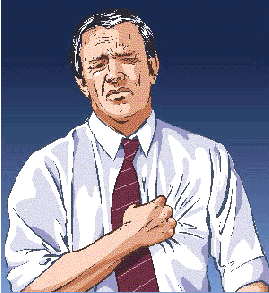The Signs and Symptoms
The symptoms developed in coronary heart disease reflect the aetiology of the disease. The main symptoms are:
- - Angina
- - Heart Attack

There are other symptoms, but may not always occur with someone with CHD. Other symptoms may be:
- - Dyspnoea (Breathlessness)
- - Heart Palpitations
- - Tachycardia (Higher than normal heart pulse rate)
- - Weakness
- - Nausea
- - Syncope/Lightheadedness
Angina
Often the first symptoms that is encountered is angina, caused by the narrowing of one or several coronary arteries.
Angina is felt like pain/heaviness/tightness in the chest, feeling similar to indegestion. But it may extend to the
jaw, neck and arms.
Angina will normally be experienced with physical exertion, such as, running, playing a physical sport, climbing
stairs, cold weather or even after eating a large meal.
However, it will normally disappear after 10 to 15 minutes, after rest, or using GTN spray/tablet.
A coronary artery that has a luminal occlusion by atherosclerosis may be able to supply
cardiac muscle with sufficient oxygen during rest/gentle excercise but not when cardiac muscle activity is increased.
For example, walking may be tolerated but running may not. The coronary artery is unable to dilate enough to allow a
greater blood flow to the demanding muscle cells. This situation is known as Ischaemia, and the area of heart affected
is unable to keep up with the physical demand.
Heart Attack
Some people, unfortunately, suffer a heart attack (also known as Myocardial Infarction, MI) as a first sign of
coronary heart disease. This will occur if the lumen of a coronary artery becomes completed occluded by the atheroma
preventing any oxygenated blood reaching an area of cardiac muscles. The muscle cells will starve and die, and leaves
permanent damage (necrosis). Due to cardiac muscle being unable to be replaced, a fibrous non-functional tissue
replaces the area, partially impairing heart function. This leads to further complications.
Dyspnoea
This is also a symptom of heart failure, where your heart is starting to becomed weakened that it cannot pump enough
blood to meet your body's demand causing you to feel very tired and short of breath.
References [Show/Hide]

Royal Free & UCL Medical School
